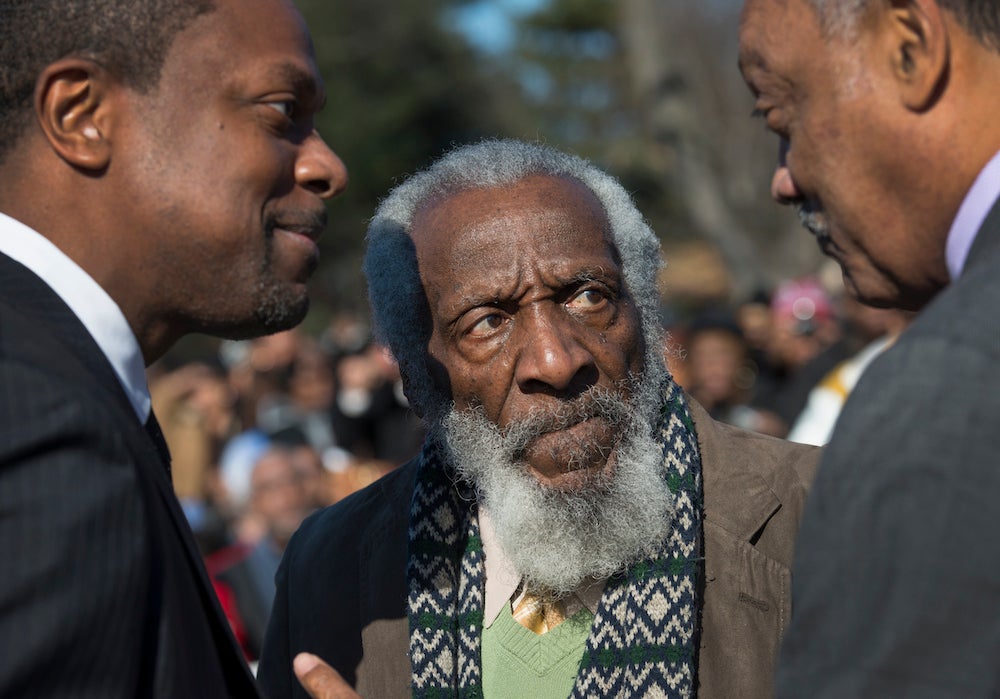
Dick Gregory, who segued from pioneering comedian to acerbic voice of the civil rights movement, passed away Saturday at the age of 84. Imagine Dave Chappelle transforming into a Black Lives Matter activist, author, nutritionist and presidential nominee after leaving behind his Comedy Central show and you’ll have some idea of Gregory’s legacy.
We’ll never have a Dick Gregory Show or boisterous buddy comedies (à la Sidney Poitier/Bill Cosby) to look back on. Dick Gregory gave up entertainment for activism, and while the entertainment world is certainly poorer for his choice, activism was clearly the higher calling. For that, Gregory will always be applauded.
Gregory’s 1964 autobiography nigger served as inspiration for the original title of Nas’s 2008 album Untitled, but the rapper’s record company wouldn’t permit the pejorative. (Times had changed.) His memoir took readers on a journey from Gregory’s upbringing in mid-western St. Louis, Missouri, to his collegiate track stardom at Southern Illinois University to a stint in the army and the budding career as a comedian that made him famous. But Gregory was only 32 in 1964, and his calling as a social activist had barely begun. By 1971’s No More Lies: The Myth and the Reality of American History, both Gregory and his audience were even clearer on what he was about politically and artistically.
Watch: Lights, Camera, Activism
He’d eventually publish 12 books and 15 comedy albums (Live at the Village Gate, In Living Black and White, etc.), making multiple movie appearances (the Black Panthers biopic Panther, for example) while fighting for African-American freedoms. Chappelle, Kevin Hart, Tiffany Haddish and any other wildly successful Black comedian of modern times owes Gregory for smashing color barriers.
Filling in for an absent comic at Chicago’s flagship Playboy Club in 1961, a young Dick Gregory killed the crowd and was immediately booked there for weeks on end. Paving the way for trailblazers like Bill Cosby and Richard Pryor, he soon appeared on The Tonight Show (hosted then by Jack Paar, 1961’s Jimmy Fallon) before mainstream white America, and they swiftly compared him to the best of their own: the late Lenny Bruce.
Always dedicated to the uplift of his people, Gregory suffered multiple arrests protesting injustice against Blacks in the U.S. In 1963, he landed in a Birmingham jail for five days after demonstrating with Martin Luther King Jr. Lending his aid to calm down rioting in Watts, Gregory got shot in the leg in ’65.
In the ’60s and ’70s, the thirtysomething comic forever cemented his status in the annals of “woke” by engaging in the first of many career-long hunger strikes against the Vietnam War, and running for president in ’68 with the Freedom and Peace Party. He was also a proud feminist and card-carrying conspiracy theorist.
Knowing that the personal is also political, Gregory (a vegetarian since the mid-’70s) also devised the Slim-Safe Bahamian Diet in 1985, a weight-loss powder created to counter poor nutritional habits in the Black community. Trying to summarize all the bullet points of his career almost does a disservice to the man’s legacy.
Digging into Dick Gregory’s lifework—that discography, bibliography and activism—is the best way to learn of Black America’s loss and what he left behind. To give Gregory the last laugh: “I am really enjoying the new Martin Luther King Jr. stamp—just think about all those White bigots licking the backside of a Black man.”